Non Metallic Electrical Enclosures

Non-metallic enclosures are lightweight yet strong, resisting UV exposure, moisture, chemicals, and extreme temperatures. Available in multiple configurations - including junction boxes, control panels, and wall-mount enclosures - they offer flexibility and reliability for industrial, commercial, and utility applications.
With NEMA 4X and IP-rated options, these enclosures prevent water and dust intrusion while remaining easy to install and maintain. Their non-conductive design ensures electrical safety, while accessories such as mounting panels, gaskets, locks, and knockouts allow full customization. Choose from trusted brands like Allied Moulded, Stahlin, and nVent Hoffman to ensure dependable protection and professional performance in any environment. Whether you need fiberglass for chemical resistance or polycarbonate for impact strength, RSP Supply provides non-metallic enclosures built for safety, efficiency, and long service life.
More Information about Non Metallic Enclosures
Enhancing the versatility of non-metallic electrical enclosures are accessories that permit further customization to meet application requirements. Available options include, but are not limited to, pre-installed mounting panels, gaskets for added water resistance, and locks. Installation and maintenance of these enclosures are straightforward, thanks in no small part to the precision with which they are designed. And installation and maintenance costs are kept low because the enclosures are adaptable to a wide range of applications (and further customizable, when necessary).
FAQs
Q: What are non-metallic enclosures made from?
Non-metallic enclosures are commonly made from fiberglass, polycarbonate, ABS, and polyester, offering excellent corrosion resistance and insulation.
Q: What are the advantages of non-metallic enclosures over metal ones?
They are non-conductive, corrosion-resistant, lightweight, and easy to install, making them ideal for environments exposed to moisture, chemicals, or UV light.
Q: Are non-metallic enclosures suitable for outdoor applications?
Yes. Most models carry NEMA 4X and IP ratings, providing superior protection from rain, dust, and corrosion in demanding outdoor conditions.
Q: Which brands offer high-quality non-metallic enclosures?
Allied Moulded, Stahlin, and nVent Hoffman are leading manufacturers offering a wide range of IP-rated non-metallic enclosures in various sizes and styles.
Q: What type of non-metallic enclosure is best for junction box use?
A fiberglass or polycarbonate enclosure with pre-installed knockouts is ideal for junction box applications, offering easy cable entry and long-term durability.
Why Buy Non-Metallic Enclosures from RSP Supply
Top Industry Brands: Access premium products from Allied Moulded, Stahlin, and nVent Hoffman for proven reliability and protection.
Full Product Range: From small junction boxes to large control panels, we stock fiberglass, polycarbonate, and ABS enclosures for every application.
Built for Harsh Environments: Non-conductive, corrosion-resistant, and NEMA 4X rated for indoor and outdoor use.
Customizable Options: Choose accessories like mounting panels, gaskets, vents, and locks for your specific needs.
Fast Shipping & Expert Support: RSP Supply provides quick delivery and technical assistance to help you select the right enclosure for your project.

